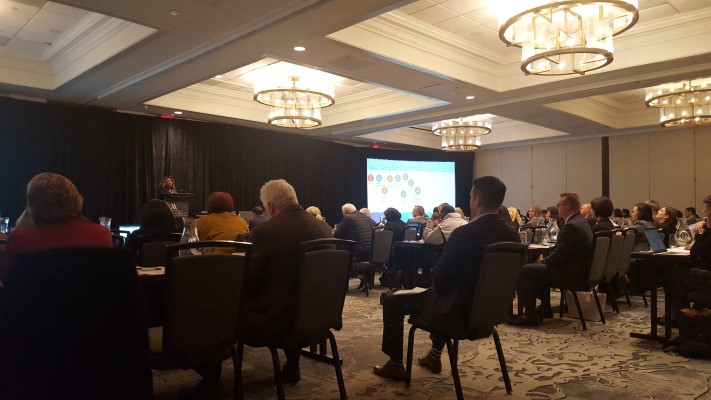
As both an attorney and a nurse, I am honored to work with such a group of dedicated individuals at URAC whose collective goal is the improvement of quality in the healthcare industry. URAC’s Accreditation and Certification Programs, whether a Specialty Pharmacy Accreditation or a Telehealth Accreditation, strive not only to improve quality in healthcare but also to protect the consumer who is on the receiving end of the healthcare delivery. Our goal is to be a leader in healthcare accreditation and to improve consumer protection. URAC’s Legal and Compliance Department strives to aid each and every employee at URAC in attaining the goal of consumer protection.
The Centers for Medicare and Medicaid Services (“CMS”) requires entities that participate in government health care programs to establish a compliance program and States have their own requirements. Private payors now have similar requirements. Healthcare compliance is the process of following rules, regulations, and laws that relate to healthcare practices. The purpose of compliance programs is to promote organizational adherence to applicable federal and state law and private payor healthcare requirements. An effective compliance program can help protect practices against fraud, abuse, waste, and other potential liability areas. Compliance programs are required for anyone participating in healthcare including hospitals, health insurers and physician practice groups. In a highly regulated, high-risk industry like healthcare, compliance is especially important. A robust healthcare compliance program also covers a wide variety of practices for the specific industry that the entity is practicing in whether it is a hospital or a Pharmacy Benefit Manager. It is a formal system that helps the organization maintain compliance with all areas of operation. In addition, it upholds the policies and procedures that prevent the organization and employees from breaching laws and regulations.
For a long time, compliance programs were voluntary for an organization to demonstrate best practices. As CMS and payors began requiring compliance programs, more organizations have implemented them. More recently, the need for an effective compliance program in healthcare transitioned from voluntary to mandatory with the requirement in the Patient Protection and Affordable Care Act (PPACA) that healthcare providers applying to enroll as Medicare providers have a compliance program in place.
In addition to decreasing the potential for fraud and abuse against the government and the healthcare entity itself, an effective compliance programs is especially important when a company finds itself in litigation. Compliance programs can ensure that litigation does not occur when organizations follow regulatory compliance requirements set forth in the compliance programs and provide evidence that all necessary and reasonable actions were taken in order to prevent an incident related to everything from lawsuits to potential criminal conduct by the organization or its employees.
The healthcare industry in the United States is one of the most regulated industries on the planet. With regulation comes regulatory oversight and enforcement from governmental agencies that are tasked with enforcement. In healthcare, that includes the specific agency’s Office of Inspector General (OIG); the Drug Enforcement Agency (DEA); the Federal Trade Commission (FTC); Department of Labor (DOL); the Department of Justice’s (DOJ) various agencies which may involve the Office of Civil Rights, the Antitrust Division or the Criminal Division and the Federal Bureau of Investigation (FBI), amongst others. Multiple agencies may be involved in the same investigation.
URAC’s accreditation and certification standards raise the bar on healthcare organizations complying with federal and state laws and regulations as well as industry best practices. Accreditation should be part of any compliance program to help ensure that appropriate safe guards are in place. Achieving and maintaining accreditation provides benchmarks for measuring how an organization is doing. The process helps organizations maintain compliance with applicable laws and regulations as well as remaining up to date on industry standards. Accreditation helps organizations focus on patient safety which has been the foundation of accreditation.
When URAC accredits an entity, URAC is issuing a seal of approval certifying that the organization has met URAC’s specific standards. Although accreditation is not indicating that every regulation and rule of law is being followed, governmental agencies as well as payors and consumers expect a high bar from accreditation. The expectation is that accreditation programs improve the process of care provided by the healthcare services that a consumer is receiving. There is expectation that customer service, clinical outcomes and quality of the healthcare services are improved as a result of an entity having achieved accreditation.
At the front line of accreditation are the Clinical and Pharmacy Reviewers and how a Reviewer implements and performs the accreditation process. Documentation is imperative and URAC’s Reviewers do a fabulous job of documentation. The accreditation Reviewer is viewed as both an auditor and investigator. The information that the Reviewer receives is crucial to the accuracy of the accreditation and the seal of approval by URAC that the entity has met the specific standards. Compliance programs have educated healthcare personnel in their rights and responsibilities in how they perform their duties. These personnel are subject to civil and criminal liabilities for not abiding by applicable laws and regulations to their industry. When a Reviewer is interfacing with the company’s personnel, the accreditation process is reliant on the fact that the information received is factual and accurate. Because healthcare is such a regulated industry, so follows the prospect of a litigious atmosphere surrounding the work that we do. URAC’s Compliance Line receives many calls annually from healthcare professionals and consumers providing feedback on the standards and instances where those standards may have been breached. URAC’s Legal and Compliance Department interfaces closely with every other URAC Department to ensure that we modify processes and practices to protect the accreditation process and the accuracy of the information we receive and ultimately our accreditation seal.


